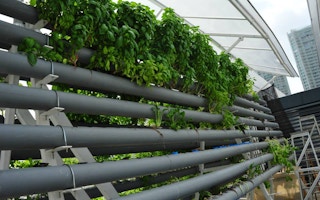From next month, vegetables and herbs will be harvested from a farm on the roof of *SCAPE building in Orchard, and as much as one tonne of produce could be harvested each month by June, filling the plates of local restaurants.
Vegetables, heirloom tomatoes, Italian basil, spearmint and peppermint are among the crops that will be harvested from Singapore’s first commercial rooftop farm run by social enterprise Comcrop, and the aim is to supply them to hotels and food and beverage outlets. Already, the company has sent product samples to 20 F&B establishments to drum up interest.
Speaking during a visit to the farm by Minister for National Development Khaw Boon Wan yesterday, Comcrop Chief Executive Allan Lim, who is also co-founder of biodiesel company Alpha Biofuels, said the company is attempting to tap the potential of “marginal land”, which is land traditionally not used for farming, for commercial farming.
Mr Keith Loh, who develops sales and marketing strategies for Comcrop, said the system adds value to land already being used. “This vertical system allows us to grow eight to 10 times the amount of conventional flat land, soil-based farming,” he said. “Because we are using aquaponics, the plants have access to an abundance of nutrients.”
“
This vertical system allows us to grow eight to 10 times the amount of conventional flat land, soil-based farming…because we are using aquaponics, the plants have access to an abundance of nutrients.”
Keith Loh, Comcrop’s head of sales and marketing
The 6,000 sq ft farm began as a test-bed outside the National Youth Council Academy, before Comcrop struck a partnership with *SCAPE to move the test-bed to the building’s roof last June.
The crops are planted in rows on pipes stacked on top of one another. The pipes draw water from tanks filled with living tilapia fishes, mimicking a freshwater lake ecosystem where by-products from fishes are broken down and absorbed as nutrients by the plants.
Commenting on his blog after his visit, Mr Khaw said Comcrop’s farm was unusual in two aspects. “First, it is right smack in our city centre, in the heart of Orchard Road. Second, it is largely run by the young,” he said.
He also commended Comcrop’s contributions to society. For example, it has invited students from Victoria Junior College and Singapore Polytechnic, as well as elderly from Tampines-Changkat Constituency, to volunteer at the rooftop farm. By passing on farming skills, more such urban farms can be built across Singapore, said Mr Khaw.
Despite high land prices in the country and the presence of lower-priced imported produce, Comcrop’s management believes its produce — which are fresher than imports — can be sold at competitive prices. “We also provide cost-effectiveness because we eliminate the whole cost of transporting (farm products) from another country to us,” he said. The company declined to reveal its prices.
Artichoke restaurant’s head chef Bjorn Shen, who has prepared food with produce from Comcrop’s farm, said local produce is fresher but also pricier and less consistent in supply.
“What is stopping a lot of restaurants from getting (local produce), is that a lot of restaurants need a certain level of stability, in terms of consistency of supply,” he said.
His restaurant is committed to using local produce, but this is possible only because it can adapt its menu to supply changes, he added.

















